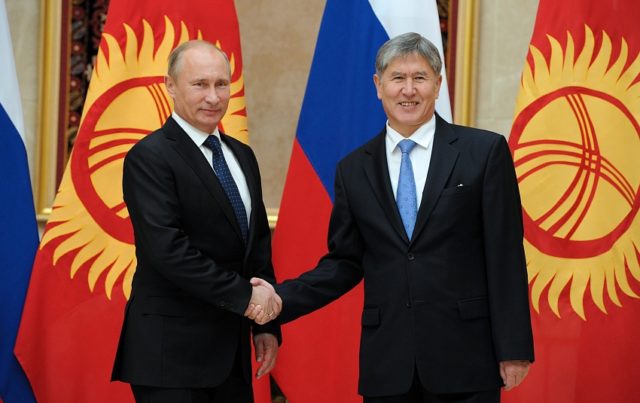
Moscow Bribes Bishkek to Stop Kyrgyzstan From Changing to Latin Alphabet
Publication: Eurasia Daily Monitor Volume: 14 Issue: 128
By:

Kyrgyzstan is not the poorest post-Soviet state, but it is the recipient of more Russian money than any other (Turantoday.com, October 11). And Moscow’s payments appear to have purchased at least one thing Moscow very much wants: Bishkek has put off for perhaps two decades or more any shift from the Cyrillic alphabet to the Latin script. Notably, all the other Turkic countries that emerged after the collapse of the Union of Soviet Socialist Republics (USSR) have already taken or are in the midst of implementing this script change—a regional trend that Moscow fears and hopes to slow or even reverse.
For many outsiders, Moscow’s concerns about the alphabets used in the non-Russian portions of the former Soviet Empire seem overblown. But from the Russian perspective, they are a central element of its vision not only of what Russia is but also what the world around it should be. After the Bolshevik revolution, the Soviets transitioned the Turkic nations of the USSR from the Arabic to the Latin script. This policy was undertaken not only because the central government in Moscow believed it would be easier to educate people using the Latin script, but also to cut these nations off from the Muslim East, which continued to use Arabic. Then, under Joseph Stalin, the USSR took the next step, changing the alphabets of the Turkic peoples from Latin- to Cyrillic-based ones in order to integrate them with the Russian majority of the Soviet population (Newsland.com, April 16).
When the Soviet Union disintegrated, the Turkic peoples who acquired independent statehood quickly explored the possibility of returning to the Latin script, something the Turkish government in Ankara promoted in order to extend its vision of a broader Turkic world. Two of the five post-Soviet Turkic states—Azerbaijan and Turkmenistan—moved almost immediately to do so. They were followed a few years later by Uzbekistan, which has made less progress in this direction. Until recently, Moscow assumed that the Turkish wave had crested and was receding; Russian representatives promoted the idea that even those countries that had shifted to the Latin alphabet should now return to the Cyrillic fold.
But that confidence was shattered earlier this year when Nursultan Nazarbayev, the president of Kazakhstan, announced that his country would begin the process of moving to the Latin script and complete the adoption of this alphabet within the next decade (Egemen.kz, April 26; Azattyq.org, April 12). The Kazakhstani president argued that using the Latin script would not only integrate his country more closely with other Turkic nations but also that it would allow Kazakhs to take more immediate advantage of the Internet world, an enormous proportion of which is in English.
Not surprisingly, Russians in Moscow and in Kazakhstan have come out against the move, viewing it not so much as a leap toward modernity or simple national justice than as an effort to cleave Kazakhstan off from the Russian world (Regnum, October 11). And since Kazakhs and Kyrgyz share so much in common—both are descended from nomadic peoples and speak closely related languages—Astana’s move sparked renewed interest in alphabet change in Kyrgyzstan. Moscow, in turn, began to worry that soon there might not be a single Turkic republic still using the Cyrillic alphabet.
The alphabet issue has been the subject of discussions in Kyrgyzstan since the 1990s, but in contrast to other Turkic countries, it was not a central one until recently. Most of the elite used Russian more often than they used Kyrgyz and consequently had little interest in making the shift. Moreover, they certainly knew that doing so would invite Russian displeasure and even a reduction in Russian aid, which the hard-pressed Kyrgyz Republic could not afford (Kokshetau Asia, October 6).
Nonetheless, the attractiveness of the Latin script for Kyrgyz speakers meant that the cause of alphabet change gained new adherents after Nazarbayev’s moves in neighboring Kazakhstan. Kanybek Imanaliyev, a Kyrgyzstani deputy, took up the cudgels for such a shift, noting that it was needed in order to ensure “the development of contemporary technology, communication, education and science.” His only concern was that Bishkek lacks the money to make the change; consequently, he proposed planning to make the shift but putting off Latinization until the 2030s or even 2040s (Kokshetau Asia, October 6).
Others involved in this discussion have taken the same line: Gulmira Duisheyeva, a linguist at the American University of Central Asia, and Chorobek Saandanbekov, a Kyrgyzstani activist who led the effort to have Kyrgyz become a language on Google, agreed. They have suggested that the experience of other Turkic countries in general and of Uzbekistan in particular shows how difficult and expensive making any change would be (Kokshetau Asia, October 6).
Not surprisingly, Moscow, the primary source of foreign aid for Kyrgyzstan, has gained the whip hand when the issue is defined in this way; and thus Kyrgyzstani officials appear to be backing away from any moves to make a change. Speaking at the Altay Civilization Forum, Kyrgyzstan’s President Almazbek Atambayev declared there is not going to be any change in scripts anytime soon (Kokshetau Asia, October 6).
What is most important here, however, is not a lack of desire on the part of the Kyrgyz people but rather their lack of funds. And that in turn carries with it an important message for Moscow: If it ever stops funding Bishkek at its current rates, Kyrgyzstan will likely follow its other Turkic counterparts and transition to the Latin script.



